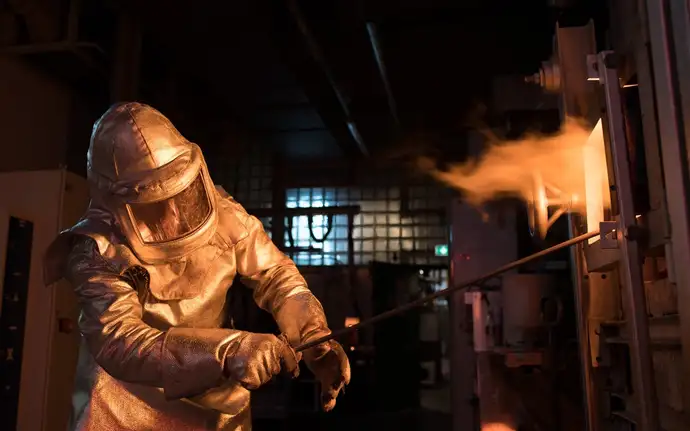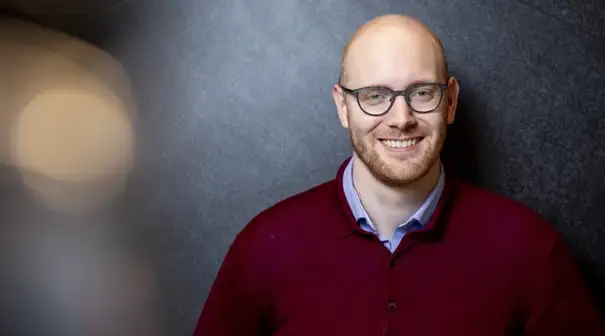SCHOTT receives funding for the construction of first climate-friendly melting tank
Tuesday, October 10, 2023, Mainz, Germany
- Federal Ministry of Economics promotes innovative technological change
- EUR 14.8 million for a pilot plant in Bavaria
- Melting tank to produce low-CO2 pharmaceutical glass with electricity
- Up to 80 percent reduction in CO2 emissions possible

The glass industry is one of the most energy-intensive industrial sectors in Germany. High CO2 emissions are generated during production. The largest share of the energy requirement is generated in the melting process. The glass raw materials are melted in refractory furnaces at temperatures of up to 1,700 degrees Celsius. Glass melting is a highly complex process. The development of new technologies is therefore associated with major challenges.
The technology Group SCHOTT is taking on this task and wants to gradually decarbonize its energy-intensive processes. Here, the company is researching innovative ways to melt glass using green electricity and green hydrogen.
Pioneering work for the entire glass industry
The Group is now demonstrating the technical feasibility of low-CO2 manufacturing of specialty glass for the pharmaceutical industry by setting up a pilot plant on an industrial scale. Over the past two years, the experts at SCHOTT have been doing basic work in various research projects. Now, the company is taking the next step: The research results will be tested on an industrial scale in an innovative melting tank concept. This pilot is pioneering work for the specialty glass industry.
“Our technological transformation is a mammoth task. It requires a massive upheaval in glass production with, in some cases, groundbreaking innovations. We ourselves are investing heavily here to achieve our ambitious climate goal,” explained Dr. Frank Heinricht, Chairman of the Board of Management of SCHOTT AG. “Such feats of strength can only succeed with the help of government research funding. The approved funding helps us to develop such technical innovations in Germany.”
Pilot plant and multi-million investment in Mitterteich, Bavaria
Around EUR 40 million are being invested in the “PROSPECT Pilot” project for the construction and use of the new glass melting tank. It will be built in Mitterteich, Bavaria.
The project period is the next three years. The pilot plant will be powered primarily by green electricity. Greenhouse gas emissions will be reduced by about 80 percent compared to current technology.
“Climate protection is an enormous challenge for the energy-intensive glass industry. We are therefore pleased to be able to support it on its way to greenhouse gas neutrality with this pilot project. Ultimately, the goal is to electrify the processes as far as possible in order to concretely promote the abandonment of fossil energies. The entire glass industry will be decarbonized in the medium term with the help of this know-how,” said KEI Director Dr. Mario Hüttenhofer at the award ceremony.
The promotion of the climate-friendly process takes place as part of the “Decarbonization in Industry” program of the German Federal Ministry of Economics and Climate Protection (BMWK). The program is managed by the Competence Center for Energy Intensive Industry in Germany (KEI).
With this funding, the BMWK is supporting energy-intensive industry in permanently reducing process-related greenhouse gas emissions. The project is also financed by the European Union through the “NextGenerationEU” fund. The main contact for the “Decarbonization in Industry” program is the Competence Center for Climate Protection in Energy-Intensive Industries based in Cottbus (Brandenburg).
Background information: Four fields of action for climate-neutral production
SCHOTT wants to achieve the ambitious goal of climate neutrality with the help of an action plan consisting of four fields of action. In addition to technological change, these include the further improvement of energy efficiency, the switch to 100 percent green electricity and the compensation of remaining emissions.
Links:
Further information on the “PROSPECT Pilot” project [in German]: Competence Center Climate Protection in Energy-Intensive Industries (KEI) (klimaschutz-industrie.de)
Further information on environmental protection at SCHOTT
Pilot project: Special pharmaceutical glass is to be melted with low CO2 emissions using green electricity for the first time in Mitterteich, Bavaria. Photo: SCHOTT
The pioneering project is receiving EUR 14.8 million in funding from the German Federal Ministry of Economics and Climate Protection.
In order to decarbonize energy-intensive industries, the project is also being financed by the European Union through the “NextGenerationEU” fund.
Pioneering. Responsibly. Together.
These attributes characterize SCHOTT as a manufacturer of high-tech materials based on specialty glass. Founder Otto Schott is considered its inventor and became the pioneer of an entire industry. Always opening up new markets and applications with a pioneering spirit and passion – this is what has driven the #glasslovers at SCHOTT for almost 140 years. Represented in over 30 countries, the company is a highly skilled partner for high-tech industries: Healthcare, Home Appliances & Living, Consumer Electronics, Semiconductors & Datacom, Optics, Industry & Energy, Automotive, Astronomy & Aerospace. In the fiscal year 2022, its 17,200 employees generated sales of 2.8 billion euros. SCHOTT AG is owned by the Carl Zeiss Foundation, one of the oldest foundations in Germany. It uses the Group's dividends to promote science. As a foundation company, SCHOTT has anchored responsibility for employees, society and the environment deeply in its DNA. The goal is to become a climate-neutral company by 2030.

Jonas Spitra
Head of Sustainability Communications

